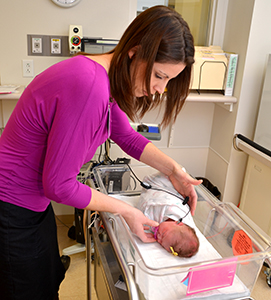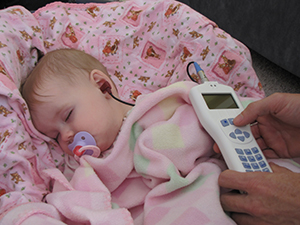There are two tests which may be used to screen a baby's hearing. Both are comfortable and are done while the baby is sleeping. For a side-by-side comparison of each test, view the ABR and OAE Infographic.
Auditory Brainstem Response (ABR)
 ABR Screening
ABR Screening
Soft clicks are played through earphones into the baby's ears. Band-Aid like sensors placed on the baby's head, measure the brain's response to these sounds. The machine compares the baby's response to an expected range of responses. If the baby's response falls in this range, the baby passes the hearing screening. ABR screens for all types of hearing loss.
 OAE Screening
OAE Screening
Otoacoustic Emissions (OAE)
Soft beeps and clicks are played into the baby's ear through a small earphone which has a microphone in it. The microphone measures a response in the ear canal like an "echo". If an "echo" response is measured, the baby passes the newborn hearing screen. If there is no "echo" response, the baby does not pass the hearing screen. OAE screens for most types of hearing loss, but cannot rule out neural hearing loss.